
TOKELAU JUDICIAL ANNUAL REPORT

|
Home
| Databases
| WorldLII
| Search
| Feedback
| Help
TOKELAU JUDICIAL ANNUAL REPORT
|
TOKELAU JUDICIAL ANNUAL REPORT
JULY 2011-JUNE 2012
TABLE OF CONTENTS
1. Year in Review/Introductory Statement
i. Statement of significant issues and development from the Ulu o Tokelau/Minister of Justice
ii. Statement of significant issues and developments from each of the Law Commissioners
2. Organisational review
i. Overview of the Courts and Police and their jurisdiction/role and functions
ii. Tokelau National Strategic Plan 2010-2015: Justice Sector Guiding Principles
iii. Organisational structure
3. Enhancing community safety
i. Atafu, Nukunonu and Fakaofo
4. Improving access to justice
i. Fakaofo
ii. Atafu
iii. Nukunonu
5. Improving information and human resource management in the law and justice sector Court results
i. Court achievements
ii. Court workload
iii. Court performance against key performance indicators
• Clearance rate
• Average duration of a case from filing to finalization
• The percentage of appeals
Police Results 2011-2012
i. Police achievements in the reporting period
ii. Police workload
Court and Police Human Resources
i. Court human resources
ii. Police human resources
6. Instituting principles of good governance and enhancing integrity in the institutions of law and justice
i. Tokelau Public Service Code of Conduct
ii. Judicial Code of Conduct
iii. Complaint Handling Mechanism for Tokelau Judiciary and Police
Management accountability
i. Annual accounts for reporting period
ii. Training and development opportunities for court staff and police
iii. Management of court and police infrastructure
iv. Court houses
v. Holding cells
vi. Police stations
7. Improving national border management
8. Appendices
Acknowledgements
FOREWORD
The rule of law underpins the freedom and safety of everyone. But it is fragile. It is not safe in any society unless the men and women of the community support the law and the system of justice which upholds it. It is difficult for anyone to support the law or the system of justice unless they are known.
In Tokelau, the laws are published and available to be read by everyone. But until now the system of justice and how it operates has not been well understood.
When I was privileged to make my first visit to Tokelau as Chief Justice in May 2011, it was difficult even for me to find out about the system of justice. It was only after talking to the Law Commissioners, to the Taupulega, and to the Women's Groups on Nukunonu, Fakaofo, and Atafu that I began to get a proper understanding. There was no written explanation or description available to me. That gap has now been filled by this excellent publication.
The first Tokelau Judicial Annual Report describes the legal system of Tokelau. It is immediately clear that, even in the sixteen months since I visited, there has been great effort to make judicial service more accessible and better understood. Much has happened in the last year, particularly in the training and organisation of the police. A comparison of the judicial work in the three villages, which is undertaken in this report, provides standards against which future improvements can be measured.
Such measurements improve access to justice and equality of treatment. They are also a great help to the Law Commissioners in responding to the needs of their communities. Most importantly, they allow the people of Tokelau to understand the administration of justice and to take ownership of it. As I have already suggested, without that ownership and the community commitment it leads to, the rule of law is at risk.
So I congratulate those who have compiled this report. I look forward to similar annual publications. And I offer my very best wishes to all who work for justice in Tokelau.
Rt Hon Dame Sian Elias
Chief Justice of Tokelau
FOREWORD
It is with great pleasure that I submit Tokelau's first Annual Judicial Report for the 2011-2012 Financial Year. This Judicial Report is Tokelau's first attempt to report on the work of our judiciary and the overall management of judicial services in the 3 villages of Tokelau. The report also includes information about the courts in Tokelau, their composition, jurisdiction and workload for 2011-2012.
As the Ulu o Tokelau, my spirit is lifted by the timely publishing of this Report and I must applaud our Judicial Officers for their effort to inform the public, court users and also the international community on their judicial performance. This report complements the vision outlined in the National Strategic Plan of Tokelau "Healthy and Active Communities with Opportunities for all". This report aims to reinforce and strengthen the application of good governance principles, so that our judicial system and processes are transparent and accountable. In doing this, I believe we are on the right path to fulfilling our vision of healthy and active communities which trust and have confidence in our judicial systems and processes.
Through this report, I am excited to see the great work of our Law Commissioners, Court Clerks and Police in implementing judicial services for our people. It is important that our judicial systems and processes are delivered to the highest standard and in line with the vision of the Tokelau National Strategic Plan. I want to acknowledge and thank the Taupulega (Village Councils) and the Government of Tokelau and other agencies for their support to build and strengthen our judiciary through training and workshop opportunities.
It is my wish to see Tokelau's judiciary continue to grow and deliver a quality justice that is fair, accessible and responsive in a timely manner to our people's judicial needs whatever their gender, colour, race, religion, age or whether they live with a disability. Furthermore, despite our small size, our judiciary continues to strive to provide a quality justice system which enables our present and future generations to come to live together safely in unity.
Fakafetai,
Ulu o Tokelau, Faipule Kelihiano Kalolo
FOREWORD
Halā halā ki vavau ke mau ki pale o Tokelau. Ko te fau tiale manogi tena o te fealofani, amiotonu o Tokelau mai te Atua kui i ana tu ma tana aganuku mai te kaloa ke pa mai lava nei. (Look, look into the past. Hold fast to the crown of Tokelau sweet smells garland of flowers woven together with harmony and integrity from God through its customs and traditions since the dawn of time unto now).
I am truly thankful for this opportunity as the Law Commissioner of Nukunonu to inform you about our services, improvements, and aspirations to improve the standard of the quality of justice on Nukunonu.
I am satisfied and very pleased with the support from the Government and, especially, from the Taupulega or Council of Elders of Nukunonu through the financial assistance provided to build and strengthen capacity to enhance the delivery of justice in Tokelau and more importantly on Nukunonu.
I will not forget the great and significant assistance provided by the Pacific Judicial Development Programme, the New Zealand Police and especially from Tokelau Legal Advisers for financial assistance and the ongoing capacity building developments to strengthen and improve the quality services of the Tokelau Judiciary. THANK YOU.
In my own observations it is very appropriate, because our actions are in line with the vision and aspirations of the Tokelau National Strategic Plan. "The people of Tokelau continues to live happily, free and safe."
Ioane Tumua
Law Commissioner
Nukunonu
FOREWORD
A FRUITFUL CATCH WHEN GUIDED BY GOD
Greetings! Those are the guided principles that direct the work assigned to us to serve our people and the Government of Tokelau. We must acknowledge and praise God for His continuous support and protection for us His Children.
I take this opportunity to thank the Government of Tokelau for the support through capacity building and law training in the past months and during last year. I especially want to acknowledge the support of the Taupulega of Fakaofo for the opportunity provided to the Court to hold hearings on Tuesday of every week of this year. This is a great opportunity to raise the standard of how we provide judicial services to our people and more importantly increasing the confidence of our people in the justice services of Fakaofo. The opportunity to exchange views and share about the challenges encountered by the Law Commissioner, Court Clerks and also with the Police while performing our respective roles.
My Observation with judicial services
The work is progressing well except there are some areas that we need to strengthen and improve:
• Ensure that people are aware of and understand the laws.
• Some people are ignorant and do not care about the laws.
• The role of police in preparation of charges and especially for the court hearing.
Challenges:
Despite the many challenges that I sometimes encountered in my role as the Law Commissioner, due to my small village and how everyone on atoll knows each other and almost everyone is related. Hence, it is very important for the defendant to understand the police report so when the report is presented in court they understand the details of the report and what has been said about them.
Well wishes to you all.
Penehe Tulafono
Law Commissioner of Fakaofo
FOREWORD
Hina talatala, Hina vekeveke, tala ake mua taku finau nei, kae ke kave koe kia Tinilau. Hina (godess) of reason, Hina (godess) of logic, help me disengage this tangle. So I may take you to Tinilau.
Kua ulugahu te tai ma kua pāgahugahu auā te mahina kua katoa. The tide is high; the waters have reached where the gahu groves grow because it is a full moon.
Kua atafia ia tuafenua e vaka na tiu, kua tau mai ki faga o Malino. The canoes that were out fishing can now commitment through the sharing of knowledge, skills and capacity by the leaders of Tokelau Judiciary at both village and national for a safe and peaceful Tokelau. The ongoing support from the Tokelau Legal Advisors, Judiciary, the General Manager, National and the Judge from the District Court of Samoa and more importantly the Taupulega of Atafu. Thank you for your endless support as we strive for a better tomorrow as Tokelau continues her journey for selfdeterminations.
See the outline of the land. They have reached the calm cove.
I want to thank and acknowledge the collective and strong.
I wish to acknowledge the hard work that went into compiling this document and putting together the work of the servants of Tokelau. Tokelau to be one.
Tagi ake la i to kaupapa, Tulī! Tulī!
Fereti Lopa
Law Commissioner
Atafu
2. Organisational review
i. Overview of the Tokelau Court system and Police and their jurisdiction/role and functions
Constitutional framework of Tokelau
Tokelau is a non-self governing territory administered by the Government of New Zealand.
Tokelau is part of the realm of New Zealand (Clause 1 (d) of Letters Patent 1989). The people of Tokelau are citizens of New Zealand.
The structure of the Government of Tokelau is outlined in the Tokelau Act 1948. The Head of State is the Queen of New Zealand. The Governor-General of New Zealand is the Queen's representative.
Tokelau is administered for New Zealand by the Ministry of Foreign Affairs and Trade, and an Administrator who is the Head of the Special Relations Unit in that Ministry.
The Parliament of New Zealand can make law for Tokelau by Acts because Tokelau is part of New Zealand. The Governor-General can make law for Tokelau as regulations (Section 4(1) of the Tokelau Act 1948).
The rights and the freedom of the people of Tokelau are contained in Rule 16 of the Constitution of Tokelau.
The main crimes in Tokelau, and the rules of criminal procedure, are set out in the Tokelau Crimes, Procedure and Evidence Rules.
The Government of Tokelau
Tokelau has two governance structures: (i) the Village government and (ii) the National government.
For the village government, decisions that relate primarily to village matters are made at village level by the Taupulega (Village Council). Village Rules are also made by the Taupulega. Disputes at the village level are settled by the Law Commissioner and the Village Appeal Committee (Section 10 of the Tokelau Amendment Act 1986, Rule 103 of the Crimes Rules). Land and custom matters are settled by the Taupulega.
At the National Government level, government decisions which affect the whole of Tokelau are made by the General Fono. The General Fono may make such rules as it thinks necessary for the peace, order, and good governance of Tokelau (Section 3A of the Tokelau Act 1948). The General Fono may not make law that contradicts an Act, regulation, or treaty that is in force in Tokelau. The General Fono may not make law that can apply or have effect outside Tokelau (Section 3A (4) of the Tokelau Act 1948). When the General Fono is not in session then the Council for the Ongoing Government which comprises 6 members makes the decisions necessary for the administration of Tokelau.
Court system
Tokelau has the following courts:
• The Commissioner's Court and Village Appeal Committee
• The High Court of NZ (operating as the High Court of Tokelau)
• The Court of Appeal of NZ (operating as the Court of Appeal of Tokelau)
The Chief Justice of New Zealand is also the Chief Justice for Tokelau.
The Commissioners who are lay judges are appointed by the Governor-General of New Zealand on the recommendation of the Minister of Foreign Affairs after consultations with the Taupulega of the relevant village. If any time the Commissioner is incapable by reason of sickness or otherwise of performing the office of the Commissioner, or where there is a vacancy in the office of the Commissioner, any person performing the functions of the Faipule becomes the default Commissioner in the village.
Tokelau has its own first instance courts: the Commissioner's Court and Appeal Committee of each village. In each Village Court, there is a Commissioner and a Court Clerk. The Appeal Committee comprises 3-4 members designated by the Taupulega to hear any appeal on the decisions of the Commissioner.
A Commissioner has jurisdiction only in respect of the island to which that Commissioner is appointed and the Territorial Sea of Tokelau that surrounds that island. The civil and criminal authority of Commissioners is to hear civil claims of up to $1,000 and deal with criminal offences punishable by a fine or up to one years imprisonment.
The sentencing power of the Commissioners is limited to imposing a fine of up to $150 and imprisonment of three months.
Serious matters such as murder, manslaughter and treason and cases on appeal are heard by the High Court of New Zealand and the Court of Appeal of New Zealand operating respectively as the High Court of Tokelau and the Court of Appeal of Tokelau. New Zealand has abolished the right to appeal to the Privy Council but a prerogative right of appeal to the Sovereign continues for Tokelau. No Tokelau case has ever gone to these external courts.
Civil cases relating to adoption and divorce applications are dealt by the Council for the Ongoing Government of Tokelau. Decisions of Council on these matters are final.
Tokelau Police
The operation of local police in Tokelau can be traced back to colonial times. The police were previously national police of Tokelau under the Tokelau National Public Service. The devolution of the core national public services to village changed the employment management of the police to the Taupulega of each village. The police officers are the law enforcers and have many functions that include, but are not limited to, the preservation of the public peace, the prevention, detection, investigations, and prosecution of offences against the laws of Tokelau and village rules. The functions of the police officers can be exercised nationally. The Police Rules gives the Administrator the power to designate a member of the New Zealand Police as an officer of the Police of Tokelau.
ii. Tokelau National Strategic Plan 2010-2015
The Tokelau National Strategic Plan 2012-2015 presents the development aspirations of Tokelau and identifies the medium term development priorities for the government of Tokelau for the period of 2012-2015. Tokelau's strategic vision calls for "Healthy and Active Communities with Opportunities for All". The vision encapsulates the view that while the people of Tokelau aspire to a healthy life and vibrant communities with equal opportunities for all, it is important that any developments undertaken in Tokelau be sustainable and lead to improving the quality of life for the people of Tokelau without compromising their culture, heritage and environment.
There are 4 main strategic development policy goals under the Tokelau Strategic Plan, one for each of the four policy outcome areas of good governance, infrastructure development, human development and sustainability. The goals are as follows:
Goal 1: Improved governance, public sector and financial management, and operation of the rule of law;
Goal 2: Improved standard of living through adequate, reliable and efficient infrastructure;
Goal 3: Improved health and education outcomes and social-wellbeing;
Goal 4: Improved economic, cultural, environmental and spiritual sustainability.
For the purposes of this Judicial Annual Report, the focus will be on goal 1 and specifically on the rule of law. The key objectives outlined under this goal clearly state:
To enhance community safety; to improve access to justice; to institute principles of good governance and enhance integrity in the institutions of law and justice; to improve information and human resource management in the law and justice sector and to improve national border management.
The objectives for the operation of rule of law clearly reflect the vision of the National Strategic Plan of Tokelau to ensure that its people continue to live in healthy communities with equal opportunities for all; hence the laws established to ensure there is peace and harmony in the communities and a judicial system that is responsive to everyone's needs and, more importantly, which provides equal opportunities for all.
Justice Sector Guiding Principles
The following guiding principles will guide the Justice Sector of Tokelau:
• Developing and building a robust justice sector in all the villages of Tokelau
• Supporting and building a reliable and accessible justice system in each of the villages of Tokelau that is trusted by the people of Tokelau
• Providing effective and quality services to support independent justice sectors in all the villages of Tokelau
• Working closely with communities to enhance safety and wellbeing for all
iii. Organisational Structure
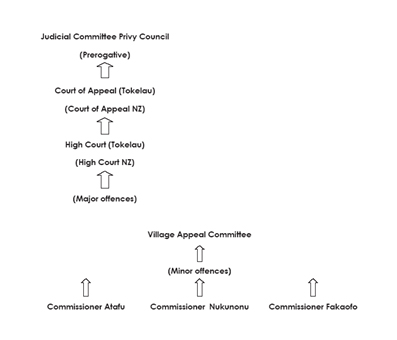
3. Enhancing community safety
The Police workloads in their respective villages are very similar as they deal with common offences that are regularly occurring in all 3 villages. It is important to recognize the workload of each police sector in relation to the number of cases they dealt with and especially enhancing community safety in their respective villages.
4. Improving access to justice
i. Fakaofo
Background
Up until the end of 2010, although the police could have been proactive with their investigations on offences lodged with them and prepared charges, the complaints laid with the police were slow in being processed and heard by the Law Commissioner's Court. The complaints took several months for the police to respond to and finally to be heard and resolved by the Law Commissioner's Court.
It was not until 2011 that changes began to take place leading to the police being more responsive to people's judicial needs and this is a positive development.
The progress has come about as a consequence of police's attendance and graduation from the Police Training Recruits in Apia. The Police Training has equipped the police with relevant knowledge and skills to do police work. The improved service delivery by the police has been well received by members of the community, and this is a positive development for Tokelau Judiciary. Through these positive changes it is now evident that members of the community are now confident to lodge their complaints with the police as the police are now being responsive and proactive when receiving people's complaints.
In Fakaofo there is now a set day (Tuesday of every week) when the Meeting House is used for the Law Commissioner's Court Hearing. Having a set day for the Court Hearing is important for the police to ensure they are responding to people's complaints and acting on them on a regular basis. This is also important for members of the community to know the day so that they can attend the Hearings.
The members of the community are now very confident and comfortable to bring their complaints to the police. The police are at the forefront of receiving people's complaints and being able to address them in a timely manner reflects well on the services they provide and they provide and the confidence that the community have in them.
The opportunity for members of the community to attend and sit in court hearings is welcomed. The public is aware they are free to attend court hearings unless the Law Commissioner holds a closed hearing. A notice will then advise that the hearing is closed to the public.
There is also the opportunity for any member of the Community to attend court hearings. However, not many attend due to work commitments and other responsibilities. The other reason why people are not attending could be related to the small building and the size as there is limited space for extra people apart from the Law Commissioner, Court Clerk, Police and the defendant/s.
ii. Atafu
The judicial services on Atafu are provided by the Police, Court Clerk and the Law Commissioner to all members of the community. The judicial services deal with people's complaints against any breach in the Crimes Rules and Village Rules. Atafu judiciary believes there are not many barriers to prevent people from getting judicial services. There are no court fees involved and the Office of the Police and Court Clerks are easily accessible by all members of the Community. There is equal treatment for women and men and likewise for the disabled. The Police in partnership with the Court Clerks have carried out workshops in the villages informing members of the communities about the judiciary systems and processes. The Police are the first point of contact for any suspected offences committed.
While the judicial services are free and accessible by any member of the community of Atafu, there are some challenges faced by members of the Community in relation to how the judicial officers dealt with their complaints and this can be seen as a barrier for members/groups accessing the court. These complaints relate to the delay by the police in investigating matters referred to them and their failure to keep complainants updated on the progress of their case. The delay in action by the police on most cases lodged is sometimes due to police capacity in terms of investigations and preparation of police reports and charges on the cases filed with the police. Other barriers to accessing the courts could relate to the Law Commissioner being away from the Villages due to medical or family reasons and sometimes these delays will prolong the process to getting court cases heard and resolved hence a great barrier to accessing justice. The persons performing the functions of the Faipule becomes the Law Commissioner by default but due to no previous training and knowledge on how to do Law Commissioner's job is certainly another barrier for people accessing the court.
The Atafu Judiciary acknowledged that another barrier to accessing court is that there is no specific building for the court hearing except to wait for the meeting house or Lotala to be available. Having a court room for the hearing will enable the Law Commissioner to hear cases on a weekly basis and minimizing delays and barriers to members of the communities in accessing the court. Nevetheless the Taupulega of Atafu has agreed to use the meeting house on Wednesday of every week for the Law Commissioner's hearing.
iii. Nukunonu
The Nukunonu Judiciary services are available and accessible for all the members of the community should they need assistance. There are no court fees and the police station is very central with its location and police as the first point of contact for people when they have problems are available at all times to serve the people. The members of the community are equally treated before the law hence despite their gender, physical and mental status they are all given the same treatment.
The Judicial Officers and the police have worked closely together through workshopsto promote judicial processes and systems so that member of the community are made aware and begin to access judicial service when the need arises.
Despite the availability of judicial services of the Nukunonu Judiciary to members of the community, but the limited skills and knowledge of that police have to deal immediately with people's complaints was seen as a barrier for people accessing court.
The court clerk and the police work hand in hand where the duty of the court clerk is to check the case files that come to court to ensure they are accurately charged to the relevance offences before the cases are referred to the Law Commissioner. If there are cases incorrectly prepared then they will be referred to the police and this will take time and was definitely a barrier to people accessing the court.
The Law Commissioner uses the Meeting House when available to conduct his court hearing. This was seen as a barrier as the meeting house was not always available due to other village priorities and cases pile up until the meeting house become available.
The Judicial officers have worked hard in educating the public about the court systems and processes and have encouraged members of the community to come forward and use the judicial services.
The delays to the court hearings on the reported alleged offences have been identified as a major barrier to justice. The delays occur mainly due to the unavailability of the meeting house to accommodate the court hearing and the unavailability of Law Commissioner and Police as they are engaged on other village activities.
The Nukunonu Judiciary looks forward to enhancing skills and knowledge of judicial services to ensure the barriers to accessing justice are overcome and the judicial needs of the community are met and addressed in a timely manner.
5. Improving information and human resource management in the law and justice sector
Court Results
Background Information
This Annual Report is the first time that case data for the three Tokelau Islands has been presented.
At the time of the census held on 18 October 2011, the "usually resident" population of Tokelau was 1,411 people. The populations of the three islands are similar with:
Atafu: 482 people.
Fakaofo: 490 people.
Nukunonu: 397 people.
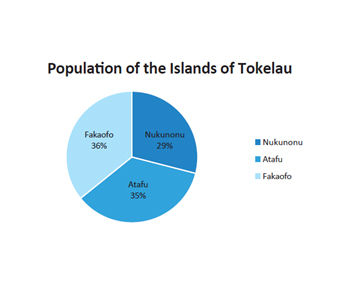
Despite the number of residents on each of the three islands being similar, the number of cases brought before the Law Commissioners from 1 July 2011 to 30 June 2012 varies significantly from 14 cases on Nukunonu to 46 cases on Atafu island. As each of the 3 islands has one Law Commissioner and one Court Clerk, the workload of the Law Commissioners and Law Clerks on the 3 islands varies significantly as follows:
Atafu: The single Law Commissioner heard 46 cases on 11 hearing dates over the year. The average duration of a case in Atafu is 50 days from filing with the Law Clerk to finalisation.
Fakaofo: The single Law Commissioner heard 25 cases on 20 hearing dates over the year. The average duration of a case in Fakaofo is 16 days from filing with the Law Clerk to finalisation.
Nukunonu: The single Law Commissioner heard 14 cases on 4 hearing dates over the year. The average duration of a case in Nukunonu is 66 days from filing with the Law Clerk to finalisation.
The 85 cases brought before the Law Commissioners on the 3 islands are all criminal cases. There were no appeals from the decisions of the three Law Commissioners in any of these cases. There are no court fees for civil cases brought before the Tokelau court.
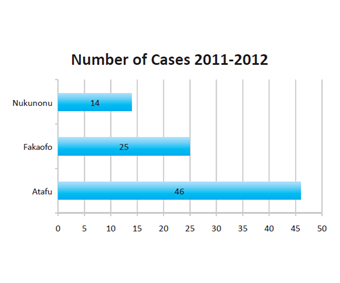
Similarly, the number of accused also varies significantly between the three islands with 73 accused on Atafu, 64 accused on Fakaofo and 14 accused on Nukunonu.
The percentage of the accused that are under the age of 18 years varies significantly between the three islands with 21% of the accused on Atafu under the age of 18 years, 59% of the accused on Fakaofo under the age of 18 years and 7% of the accused on Nukunonu under the age of 18 years.
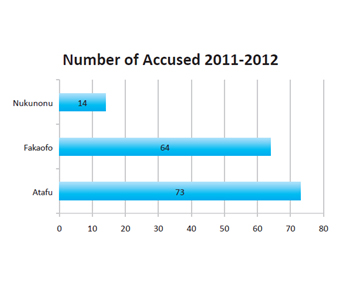
There is a 100% clearance rate for cases brought before the Law Commissioners in Tokelau during 2011-2012.
Atafu
Of the 46 cases filed in the Atafu court during 2011-2012:
50% were finalised within 30 days of filing at the courthouse;
4% were finalised between 31 and 90 days of filing at the courthouse;
43% were finalised between 91 and 180 days of filing at the courthouse; and
2% were finalised over 180 days of filing at the courthouse.
The average duration of a case in Atafu is 50 days from filing with the Law Clerk to finalisation.
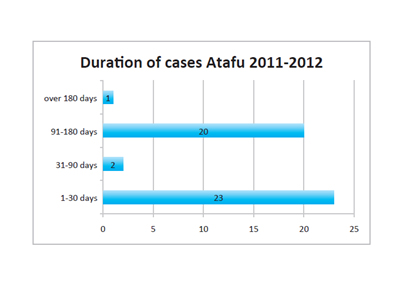
The gender breakdown of the accused in the 46 Atafu cases is 29% female and 71% male.
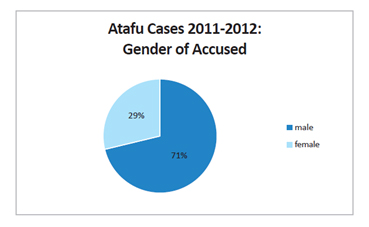
21% of the accused in the 46 Atafu cases are under the age of 18.
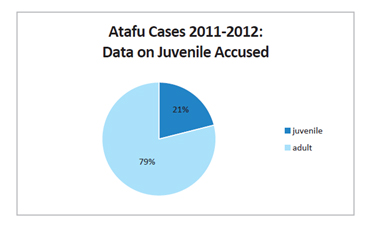
In 100% of the 46 Atafu cases the accused plead guilty.
Fakaofo
92% of the 25 cases filed in the Fakaofo court during 2011-2012 were finalised within 30 days of filing at the courthouse. The remaining 8% of cases were finalized within 60 days. The average duration of a case in Fakaofo is 16 days from filing with the Law Clerk to finalisation.
The gender breakdown of the accused in the 25 Fakaofo cases is 75% male and 25% female.
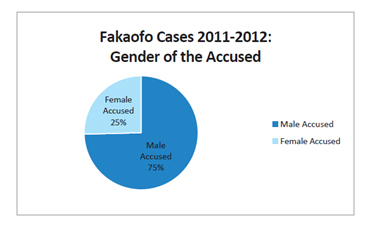
59% of the accused in the 25 Fakaofo cases are under the age of 18.
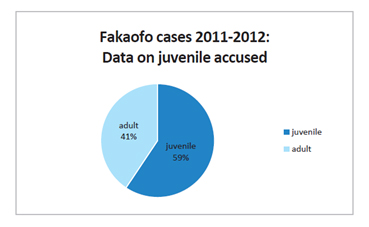
Nukunonu
100% of the 14 cases filed in the Nukunonu court during 2011-2012 were finalised within 90 days of filing at the courthouse. The average duration of a case in Nukunonu is 66 days from filing with the Law Clerk to finalisation.
The gender breakdown of the accused in the 14 Nukunonu cases is 86% male and 14% female.
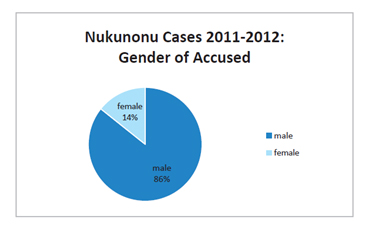
7% of the accused in the 14 Nukunonu cases are under the age of 18.
In the 14 Nukunonu cases, 2 cases (14%) were dismissed as there was insufficient evidence to proceed and the accused pleaded guilty in the remaining 12 cases (86%).
Police Results 2010-2011
i. This report accounts for the achievements by police across the three villages. The Police are extremely pleased with their overall achievements in this reporting period. The standard of services provided by the police is same across all the villages. The highlights in the performance by the police are given below:
• Provide security and support to the Taupulega, General Fono, and Community Meetings.
• Escorting School students to and from school.
• Training.
• Patrolling.- Beat patrol, Mobile patrol./village curfew.
• Boat patrol.
• Quarantine
• Involvement and organising sports and activities. Youth and Sport groups.
• Community awareness workshops./ Proactive.
• Enforcing general rules. (Village rules and Tokelau Government law.)
• Protect life and property.
• Assist anyone who needs assistance.
• Taking part in local projects, e.g. seawall, solar project.
• The vision of the Police is that the Tokelau people will live in a peaceful and a safe community.
ii. Police workload
Atafu
- Underage drinking
- Fighting in public
- Drunkenness
- Fraud
- Adultery
- Theft
- Bodily harm
- Throwing stones
- Noise
- Homebrew
- Civil cases
- Spreading rumours
- Careless driving
Nukunonu
- Underage drinking
- Drunkenness
- Assault
- Noise
- Disorderly
- Adultery
Fakaofo
- Underage drinking
- Fighting in public
- Drunkenness
- Trespassing
- Theft
- Adultery
- Assault
- Throwing stones
- Noise
- Home brew.
- Careless fire
- Sniffing.(petrol, glue . etc)
- Civil cases
- Spreading rumours
Court and Police Human Resources
i. Court Human Resources
Nukunonu
Law Commissioner Mr. Tumua Ioane
Court Clerk Miss Lepeka Amato-Perez
Law Commissioner by default: Person performing the functions of Faipule
Fakaofo
Law Commissioner Mr. Penehe Tulafono
Court Clerk Mr. Iona Tinielu
Atafu
Law Commissioner Mr. Feleti Lopa
Court Clerk Miss Latu Lopa
Village Appeal Committee
In each village there are members previously appointed by each Taupulega for their Village Appeal Committee. The members for each Village Committee are a maximum of 3 members.
ii. Police Human Resources
Atafu
1 Sergeant. Male (Reupena Leitu.)
2 Male constables. Poni Simi, Amanaki Paulo.
1 female constable. Hegalo Vitale.
Nukunonu
1 Sergeant. Hefo Leo. Male (new appointed Sergeant)
3 Male constables, (one qualified officer, Aleki Silao), Tegei Lui, Viliamu Ioapo.)
1 Female constable. (Nive Wright)
Fakaofo
1 Sergeant. Male (Safiti Gaualofa.)
5 Male constables.
- Tavita Pue
- Kovati Gasologa
- Tavita Gaualofa
- Gau Gau
- Heo Peleni.
Fakaofo needs a female police officer at the moment.
All the above officers were trained in the Police Recruit course in Samoa, except the sergeant and three constables from Nukunonu.
We would like to acknowledge the presence of Terry Gibbons, he is an important resource to our National Police Force.
Each Police Station needs resources to enable us to do our work in the office, for example, laptops, printers, police hand held radios, a boat for travel between the islands, (Fakaofo) and stationery.
6. Instituting principles of good governance and enhancing integrity in the institutions of law and justice
i. Tokelau Public Service Code of Conduct
The Tokelau Public Service Code of Conduct was endorsed by the General Fono in 2004. It is a set of rules which clearly defines expected behaviours and standards of integrity from members of the public service. The Code of Conduct also outlines expectations of the employer from the employees as well as the expectation of the employees from the employer. The employer has the responsibility of administering the Code of Conduct through ensuring that all public servants follow and abide by all stipulations in it. Unacceptable and inappropriate conduct, failure to meet required standards of performance may lead to disciplinary measures. It is a responsibility of all public servants to read and understand the Code of Conduct.
There are three principles under the Tokelau Public Service Code of Conduct:
(i) employees shall fulfil their lawful obligations to the Tokelau authorities with professionalism and integrity;
(ii) employees shall perform their official duties honestly, faithfully and efficiently, respecting the rights of the public and their colleagues;
(iii) employees shall not bring the Tokelau public services into disrepute through their private activities.
ii. Judicial Code of Conduct
The Judicial Code of Conduct provides guidelines and rules to the Law Commissioners Tokelau on how they should carry out their roles and more importantly for the members of the Community to know and understand the expected behaviors from the Law Commissioners when they carry out their duties. The common principles in practice are:
(i) Diligence: The duty of the Judges to serve diligently when they deliver decisions without any unnecessary delays.
(ii) Integrity: Judges must conduct themselves with utmost integrity to sustain and enhance public confidence in the judiciary.
(iii) Equality: Judges must conduct themselves and proceedings so as to ensure equality according to the law.
(iv) Judicial independence: Judges must make their decisions independently.
(v) Impartiality: Important for Judges not only to be impartial but also to appear to be impartial in their decision making.
(vi) Judicial demeanour: Judges must maintain firm control in the court room and ensure people in the court are treated with courtesy and respect.
(vii) Courtroom conduct: Important for the Judges to ensure that the people coming to Court are treated with respect and are being served.
(viii) Communication in Court: The Judges should communicate clearly so that the people in court understand what has been said.
iii. Complaint Handling Mechanism for Tokelau Judiciary and Police
At present there is no established complaint handling mechanism for the Tokelau Judiciary and Police. While the Police and Judiciary hear that there are people who are not satisfied with their services there were no formal complaints received.
The Tokelau Judiciary and Police value the voice of the community especially the opinion of our court users on whether their judicial needs are met. There have been discussions on several options such as having a survey or questionnaire, having a book where people can register their complaints or even have a box where people can drop in their complaints. One of those options would assist the Judiciary and Police to find out how the court users and members of the communities feel about their court performance and what areas they need to work on to improve the delivery of justice and especially that our justice systems and processes are responsive to our people's judicial needs.
Management accountability
i. Annual Accounts for Reporting Period
The 3 respective judiciaries of Tokelau, in Fakaofo, Nukunonu and Atafu, are under the management of their respective Village Councils hence the financial management of each village judiciary accounts is managed under each village budget in accordance with the approved funding allocations for judicial services and police for that particular financial year. In each village, the Financial Manager oversees village funding for this period in partnership with the Tokelau Government Department of Finance who has overall responsibility for reporting on Village and Department expenditures for financial year 2011/2012 to the General Fono. The allocation of funding for each judiciary from the overall village funding differs and reflects their approved budget by the General Fono as well as village development priorities for that particular period.
ii. Training and development opportunities for court staff and police (national and regional)
Training and development opportunities for Tokelau judicial officers and police at both national and regional level are a significant component of the Tokelau National Strategic Plan. This is to ensure that the delivery of a quality justice service for the people of Tokelau is maintained at a high level. The development of human capacity is pivotal and a priority for the Tokelau judiciary. The Tokelau judiciary is grateful to the Government of Tokelau, the Taupulega and the Pacific Judicial Development Programme for ongoing support in the national and regional training of Tokelau Judicial Officers.
The Government of Tokelau has in the past co-funded with the Pacific Judicial Development Programme national training mainly for the capacity building of the Law Commissioners, Court Clerks and the Police. Past training has also included members of the Appeal Committees from the respective villages.
For the financial year 2011-2012 the training that was carried out in August for the Law Commissioners of Tokelau was attended by 2 of the 3 Commissioners. The training's main objectives were to enhance the knowledge and skills of the Law Commissioners on their roles and responsibilities and to ensure their duties are carried out to the best of their ability and in accordance with the law. The importance of adhering to the code of ethics in their judicial roles, particularly on issues related to conflicts of interest and the need to develop better working relationships with each other was also discussed.
The Tokelau Police Officers have been fortunate to take part in the Samoa Police Recruits training in 2011 and 2012. The first 3 police officers that took part in the first 2011 intake were funded by the New Zealand Police. The second recruits and last recruits for 2012 were funded by the Taupulega of the 3 villages. We have about 11 police officers who have gained police training from Samoa.
In June 2012, national training funded through responsive funds from the Pacific Judicial Programme, was attended by the Law Commissioner of Nukunonu, Court Clerks, Police Sergeants and Constables, NGOs representatives and likewise members of the Taupulega or Village Council representatives. This training considered the roles and duties of the Law Commissioners, Court Clerks and Police, and the need to have standardised written job descriptions. This training also covered the code of ethics and the need to adhere to the code of ethics. The other part of the training focused on the work of the judiciary particularly access to justice for all and the need to produce an annual report to explain to the people of Tokelau and outside Tokelau the work of the Tokelau judiciary.
Regarding regional training opportunities, one Law Commissioner participated in a regional training programme funded by the Pacific Judicial Development Programme for lay judges which was held in Papua New Guinea in September 2011.
In March 2012, one Court Clerk participated in a regional training programme funded by the Pacific Judicial Programme on Training for Trainers in the Cook Islands.
The availability of regular national and regional training opportunities for Tokelau judicial officers to enhance their judicial skills and knowledge is significant as this can only contribute to overall improvements in the delivery of justice for the people of Tokelau.
iii. Management of court and police infrastructure
iv. Court Houses
It is important to note that in the 3 villages of Tokelau there are no court houses. The court cases are held in the village meeting house in the village of Atafu and Nukunonu. On the village of Fakaofo, the court cases are held in the office of the Law Commissioner. Prior to holding court cases the court clerks must ensure the meeting house or office is ready and clean in preparation for cases.
The Law Commissioners and Court Clerks do have offices and some are housed in the same office with other public service. In the village of Fakaofo and Nukunonu the Judicial Officers do have their own space although office is also shared with others.
Police offices
In all the 3 villages of Tokelau the police officers have their office space in the same office/building which is shared by all village employees. The police officers are responsible for the management of their office and any other infrastructure which belongs to them.
There are no holding cells at present at any of the police stations but the police would like to have some cells built for security purposes especially for drunken people whom the police need to supervise.
7. Improving national border management
The police exercise some border management responsibilities mainly in relation to checking the luggage of incoming passengers within atolls but also from outside Tokelau. The police have identified the need to establish a border management mechanism for police within their respective villages to enable the police to provide border management role both within the 12 miles and territorial waters of Tokelau.
• Yacht boarding.
• Territorial waters
• EEZ (future achievement)
• Need good facilities and training to guard our border and coastline.
8. Appendices
Atafu's Expenditures for this Financial Year:
1 Judicial staff salary and wages $25,445
2 Police Officers salary and wages $42,165
ACKNOWLEDGEMENTS
The Government of Tokelau acknowledges the ongoing support of the Pacific Judiciary Development Programme and Cate Sumner, Judicial Monitoring and Evaluation Adviser, for their significant contribution to the development and analysis of the court data for Tokelau's first ever Judicial Annual Report.
We also acknowledge the ongoing support from Professor Tony Angelo.
We also acknowledge the Judicial Officers in the Villages, the Law Commissioners, the Court Clerks and the Police for their parts in putting together the Report.
REPORT COMPILED BY THE NATIONAL JUDICIAL COORDINATOR LISE HOPE SUVEINAKAMA
OFFICE OF THE COUNCIL FOR THE ONGOING GOVERNMENT OF TOKELAU
PacLII:
Copyright Policy
| Disclaimers
| Privacy Policy
| Feedback|
Report an error
URL: http://www.paclii.org/tk/tokelau-judicial-annual-reports/2011-2012.htm